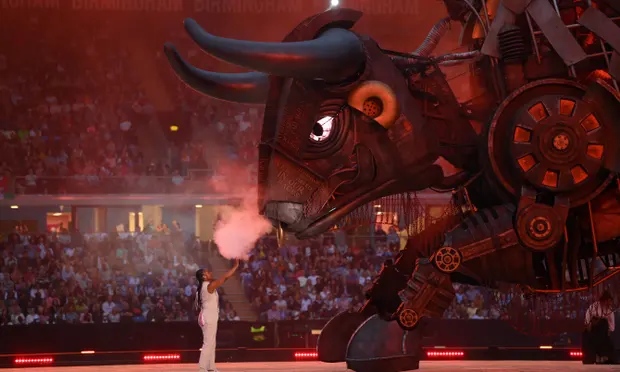
With a 10-metre-tall raging bull, a union jack made from 72 cars, and an appearance by Malala Yousafzai, the Commonwealth Games kicked off on Thursday night with an unashamedly loud celebration of everything Birmingham.
Crammed with references to the host city’s history and culture, the two-and-a-half-hour opening ceremony marked the start of Britain’s biggest multi-sport event since the London Olympics.
The Brummie drag queen Ginny Lemon got a starring role in a lemon-shaped hot air balloon, while Duran Duran closed the show with a rendition of their greatest hits, as fireworks flared over the newly refurbished Alexander Stadium.
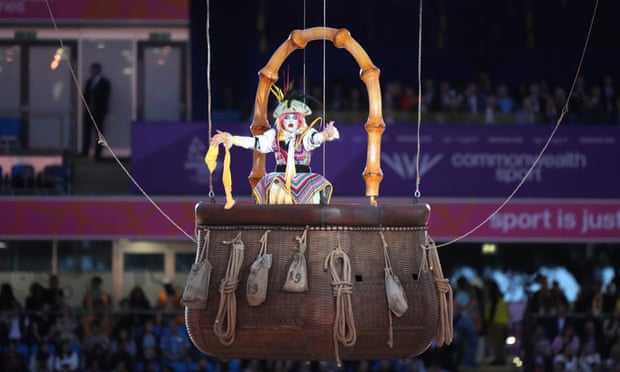
“It feels like these games have come around at the right time for this city,” said the show’s artistic director, Iqbal Khan. “We are ready to make a statement to the world about ourselves. Birmingham is one of the most exciting places in this country at the moment and I think it’s a beacon to a lot of places around the world about how you can celebrate and enjoy living with difference.”
The opening ceremony was 18 months in the making, the work of a creative team featuring the Peaky Blinders creator Steven Knight and the Super Bowl half-time director Hamish Hamilton.
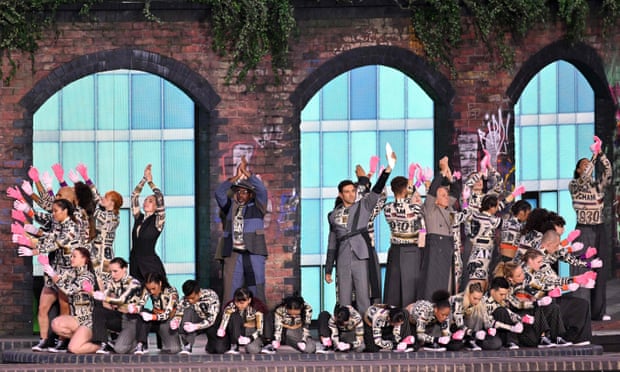
Although Brummies are known for their modesty and self-deprecation when it comes to their city, the show seemed to signal the start of what has been hailed as a “golden decade” and renewed confidence in the region.
Dame Louise Martin, the president of the Commonwealth Games Federation, said she believed this year’s event would be “one of the greatest and most important editions of the Commonwealth Games in our 92-year history”. She said: “Our 72 nations and territories are all here, and Birmingham looks magnificent. The city and wider region will provide the perfect stage for our athletes to compete.”
The opening ceremony followed the journey of Stella and the Dreamers, a group of young athletes from around the Commonwealth, through Birmingham’s history.
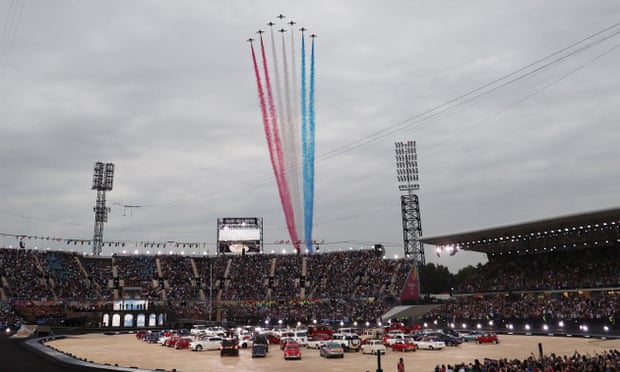
The most visually impressive element of the show was the raging bull, a giant aluminium and steel puppet constructed around a forklift truck-like machine from materials sourced in local factories. It was dragged into the stadium by 50 women representing chainmakers from the Industrial Revolution.
There was also a group of giant puppets portraying regional pioneers such as Edward Elgar, William Shakespeare and Samuel Johnson, while another set piece involved a parade of trucks featuring Birmingham inventions such as pen nibs, police whistles and the Baskerville font.
“We tried to give everything an edge. The canal water that the tower rises out of has an old bike and shopping trolley in it,” said the set designer Misty Buckley. “There’s a bit of humour and a bit of wit that says, ‘We’re still in Birmingham, we’re not taking ourselves too seriously here.’”
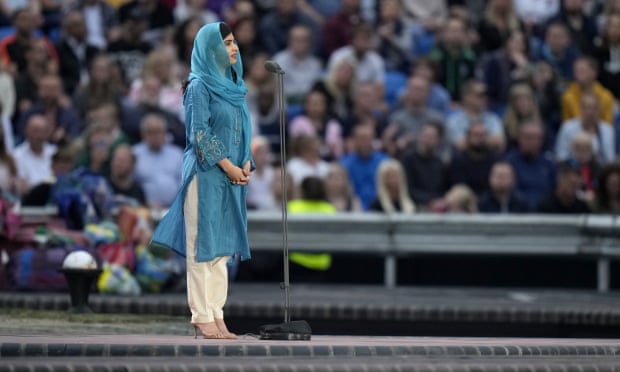
Nobel peace prize winner Malala Yousafzai, who settled in Birmingham after she was flown to the UK for medical treatment when she was shot by the Taliban, spoke about her love for her new home, including “the doctors and nurses at Queen Elizabeth hospital” and “the teachers who inspired me”.
“Over the next two weeks, when we watch the incredible athletes of the Commonwealth Games, remember that every child deserves the chance to reach her full potential and pursue her wildest dreams,” she said.
There were performances from the Black Sabbath guitarist Tony Iommi and the alto-saxophonist Soweto Kinch, joined by rising Birmingham stars Indigo Marshall and Gambini. They played Hear My Voice, a reimagined version of the title track from the 2020 film The Trial of the Chicago 7.
Khan said the show was designed to be “an unparalleled show of excellence for the live audience, but also a broadcast show that has an ambition that has never been conceived before”.
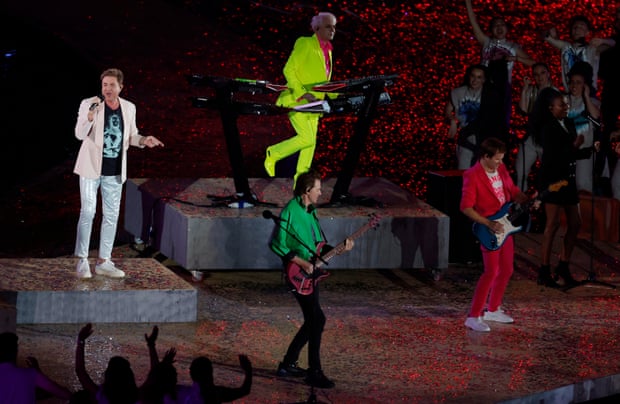
Earlier on Thursday, the culture secretary, Nadine Dorries, raised eyebrows when she told the BBC that the Commonwealth Games was “putting Birmingham on the map”. The city is England’s second biggest.
Excitement about the Games has been building for months. A new aquatics centre in Sandwell opened earlier in the year, while Alexander Stadium in Perry Barr underwent a £72m renovation in time for the event, which Birmingham was awarded in 2017 as a replacement for Durban in South Africa, which was pulled as host over financial concerns.
However, there have been growing questions about the relevancy of the Games in the 21st century and the event’s historical links to colonialism.
The Queen was not present at the opening ceremony owing to ongoing mobility issues, so Prince Charles read out a message from her to mark the start of the Games.
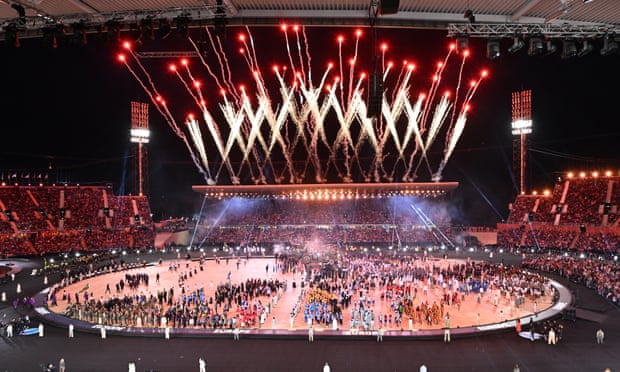
She described Birmingham as “a pioneering city which has drawn in and embraced so many throughout its history” and a place that is “symbolic of the rich diversity and unity of the Commonwealth”.
A number of famous athletes made appearances to carry the Queen’s baton during the ceremony, including the Olympic diver Tom Daley, who ran alongside people from the 35 Commonwealth member states which outlaw homosexuality.
Birmingham stars including Sir Lenny Henry and Joe Lycett also made appearances to introduce the Commonwealth nations.
Before introducing competing teams from Asia, Lycett said: “I’m going to do something the British government doesn’t always do and welcome some foreigners.”
… we have a small favour to ask. Millions are turning to the Guardian for open, independent, quality news every day, and readers in 180 countries around the world now support us financially.
We believe everyone deserves access to information that’s grounded in science and truth, and analysis rooted in authority and integrity. That’s why we made a different choice: to keep our reporting open for all readers, regardless of where they live or what they can afford to pay. This means more people can be better informed, united, and inspired to take meaningful action.
In these perilous times, a truth-seeking global news organisation like the Guardian is essential. We have no shareholders or billionaire owner, meaning our journalism is free from commercial and political influence – this makes us different. When it’s never been more important, our independence allows us to fearlessly investigate, challenge and expose those in power

Be the first to comment